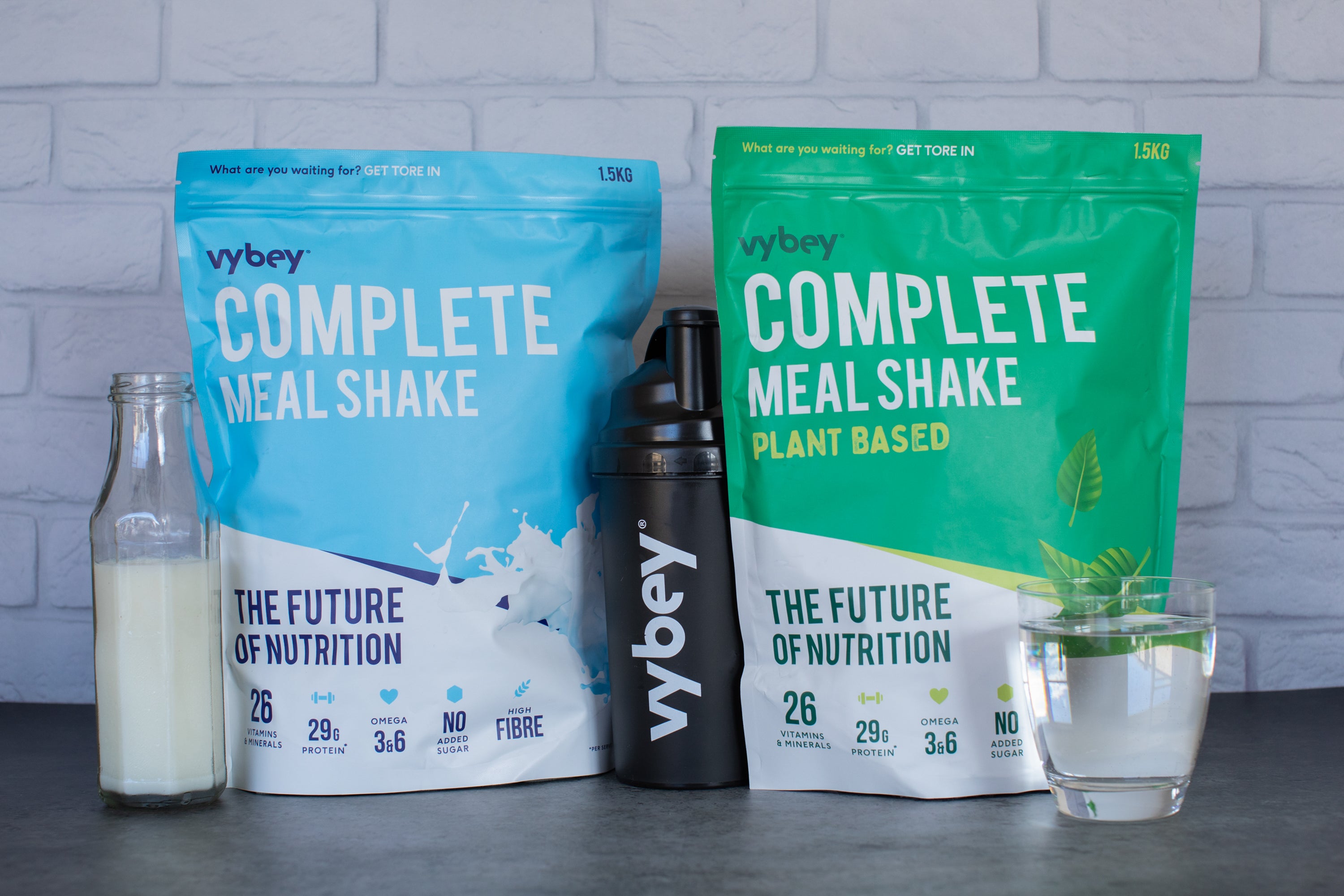Meal replacement shakes are brilliant for calorie counting and fending off hunger, but what should you look for when choosing one?
Most importantly, grab a bonified meal replacement shake and not a protein shake or mass gainer in disguise.
The difference is that meal replacements shakes have a complete nutritional profile – protein, carbs, fat, fibre, vitamins, minerals – to replicate a nutritious meal, and in turn, fully satisfy your body’s urge for real food.
Your meal replacement shake should taste fantastic and keep your tummy and digestive system in check with no bloating or excessive gas, although some trial and error is normal as your body adapts to its new changes in diet.
You want as many natural ingredients as you can get, meaning no artificial sweeteners, flavourings, or fillers to bulk out the shake, because these can wreak havoc on your tummy and consign your bag of powder to the bin.
A nutritious meal replacement
Nutritious meals contain the perfect combination of protein, carbs, fat, and fibre that our bodies need to stay healthy, and the same applies to meal replacement shakes.
Imposters include pure protein shakes, lean mass gainers (usually a 1:1 ratio of protein powder and ground oats), and nutrition drinks (usually milk protein with heaps of sugar).
None of these are nutritious meal replacements, and it’s a sin to market them as such – they are supplements (and sometimes bad ones), nothing more.
You generally need 45–65% of your daily calories from carbs, 20–35% from fats (less than 5% from unhealthy ones), and 10–35% from protein.
Now, here’s what a nutritious meal replacement shake contains per 100g serving:
- 380-440 kcal.
- 25-30 grams of high-quality protein (ideally plant-based).
- 8-12 grams of fat with less than 6g of saturated fat.
- 40-45 grams of carbohydrates with less than 10 grams of sugar and no artificial sweeteners or additives – although natural sweeteners are fine.
- 5-10 grams of dietary fibre.
- 300-400 mg of sodium.
- Vitamin A, Vitamin C, Vitamin D, Vitamin E, and all B vitamins and minerals, including calcium, iron, copper, magnesium, and zinc.
- Probiotics and prebiotics for gut health – bacillus coagulans are the most common friendly bacteria in meal replacement shakes.
The nutritional profile above is roughly equivalent to eating one 300g chicken breast with the skin on, brown rice, broccoli, and salt to season, with a small yoghurt for dessert.
Additional ingredients

Some meal replacement shakes, including vybey Complete Meal Powder, contain extra ingredients for additional nutrition:
- Biotin or vitamin H to metabolise fats and carbohydrates into energy. Biotin also helps maintain a healthy nervous system and promotes nail, hair, and skin growth.
- Omega 3 and Omega 6 promote brain and heart health, reduce inflammation, and help bones and muscles work properly.
- Lion’s mane for nootropic power—this mushroom extract can help keep your mind sharp and boost immunity.
None of these ingredients are necessary in meal replacement shakes, but they do make for a more nutritionally complete product.
Shake blendability
vybey Complete Meal Replacement dissolves in water with a shaker and doesn’t need a blender to mix thoroughly. Milk - whether dairy or plant-based - is thicker than water, so it needs a more rigorous shake to mix into a perfect drink.
Some meal replacement shakes aren’t as easily mixed and require an electric blender to achieve ideal consistency. Real customer reviews will tell you what’s what, so read these to ensure you aren’t lumped with a difficult product.
Shake consistency
Regardless of how well you mix or blend a meal replacement shake, the ground foods in it will always impart some texture to the palate.
vybey Complete Meal Replacement contains ground oats, flaxseed, corn, rice, coconut, and pea protein, which give the shake its fantastic nutritional profile.
Blending will smoothen out your meal replacement shake, but bear in mind that it will never be completely smooth like a protein shake.
Most importantly, your shake has no lumps and doesn’t stick to the bottom of your shaker. Put your liquid in first to avoid that.
Shake taste
Your meal replacement shake should be delicious and have just the right amount of sweetness. This means the natural sugars and sweeteners should not leave a sickly taste in your mouth (as is the case with so many sweetener-laced protein shakes).
vybey Complete Meal Powder comes in two flavours, Chocolate Caramel and Smooth Vanilla, to satisfy any taste.
The chocolate flavour is vegan-friendly, using organic cocoa (plant-based only) and pea protein, while the vanilla version is vegetarian-friendly, using milk and whey protein. Both use a healthy amount of coconut flour, and the natural sweeteners are stevia leaf and monk fruit extract (both healthy).
You can always add ingredients like berries, bananas, cocoa powder, or peanut butter to sweeten or enhance your shake’s nutritional profile. We like adding a handful of frozen summer fruits or organic blueberries.
Shake price
Meal replacement shakes that use all-natural and organic ingredients, like vybey Complete Meal Powder, come in between $3.30 and $2.50 per meal. You can save money by buying in bulk, or you can subscribe and save 10%.
Here are some price examples (subject to change):
- One pack - $98.99 with 30 meals. $3.30 per meal.
- Two packs - $165.99 with 60 meals. $2.77 per meal.
- Three packs - $240.99 with 90 meals. $2.68 per meal.
- Four packs - $299.99 with 120 meals. $2.50 per meal.
Meal replacement shake prices differ between brands, so there are cheaper and more expensive examples. But at those prices, you really can’t complain, and you can always buy a small pack to test the water first.
vybey comes in 1.5kg pouches, providing either 30 meals for 50g servings (1 scoop, ~200 calories) or 15 meals for 100g servings (2 scoops, ~400 calories).
The 50g serving is suitable for a small meal, while the 100g serving is recommended as a standard-sized meal – perfect for teatime.
Our sample packs are available in 100g pouches, offering options of 400g or 800g. Choose from flavours like Dairy Vanilla or explore our plant-based selections: Banana, Chocolate, or Strawberry.
This equates to either 20 meals for 50g servings (1 scoop, ~200 calories) or 10 meals for 100g servings (2 scoops, ~400 calories).
Summing Up

Your meal replacement shake should provide up to 400 calories per serving with up to 30 grams of protein and 45 grams of carbs. The fat should be as high as 12 grams and the fibre up to 10 grams – an ideal nutritional profile.
However, the best meal replacement shakes are also fortified with vitamins, minerals, antioxidants, and pre-and probiotics to mimic a healthy meal.
Your shake should go down a treat with a flavour you look forward to, and other than a brief adaptation period (2-3 days), it shouldn’t give you any upsets.






Comments (0)
Back to vybey blogs